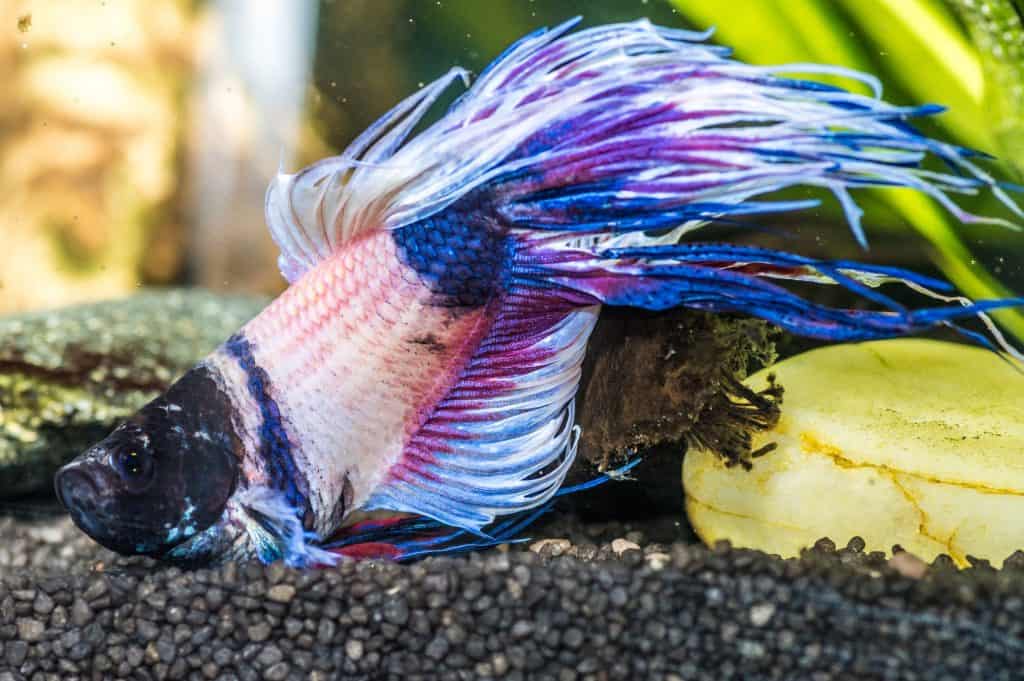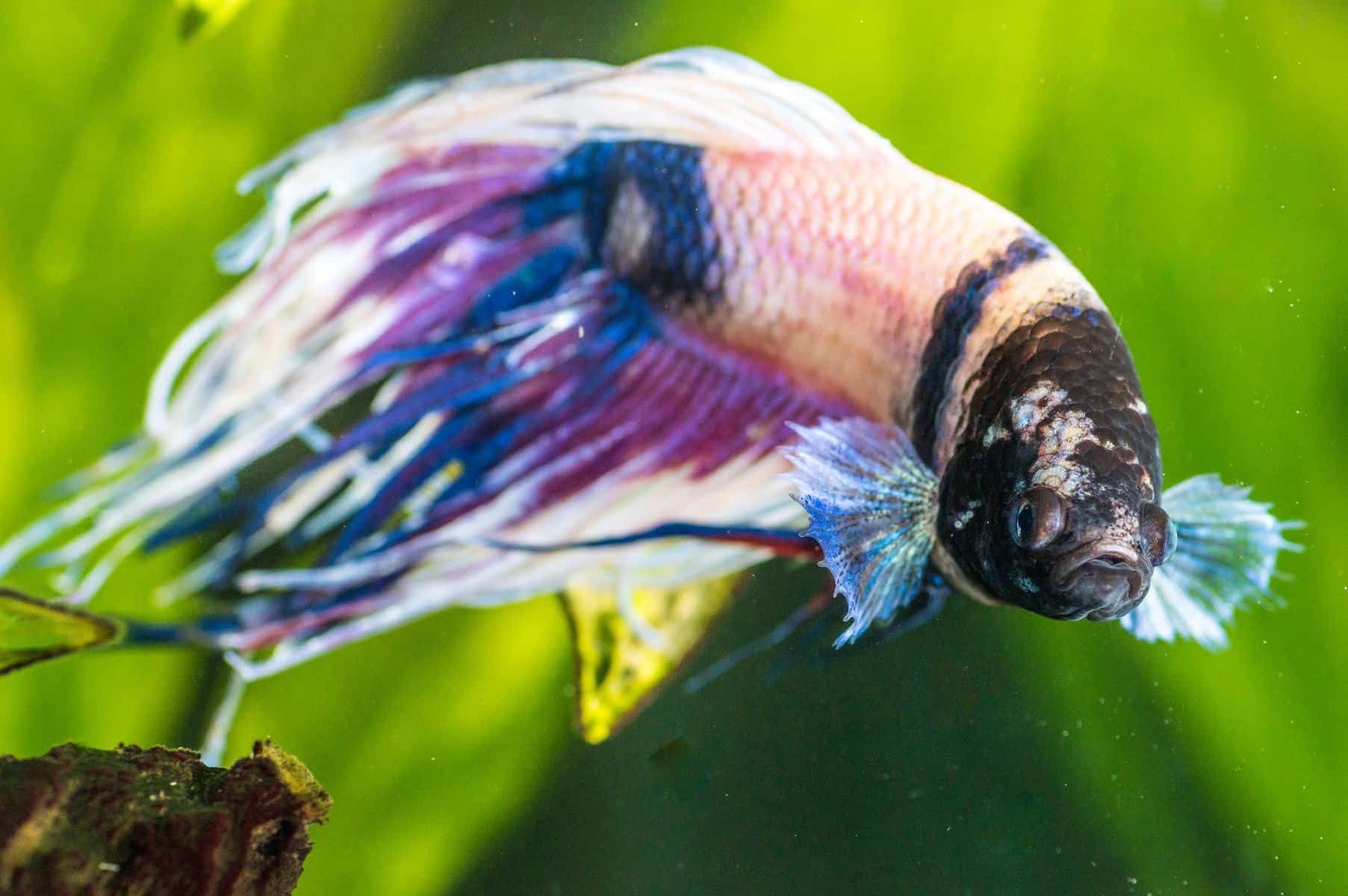Just like humans, betta fish can have seizures. Unfortunately, even a healthy betta fish is very unlikely to survive after experiencing one, but there are multiple ways to prevent seizures from happening in the first place and a few remedies that might help your fish on its road to recovery. It should be noted that all fish can have seizures, and the symptoms and treatments are similar across species.
Keep reading to find out everything you need to know about betta fish seizures and how to be prepared if your betta ever sadly has one.
How do you know if your fish is having a seizure?
Fish have nervous systems and are fully capable of experiencing a seizure; fish can even have heart attacks, strokes, or experience other major trauma. Sometimes the fish is genetically predisposed to seizures and might even be epileptic, but most times there is a singular reason for the episode.
If you notice your tropical fish moving or twitching rapidly and unintentionally with shortness of breath, then your fish might be having a seizure. In the moment, there is not much that you can do for your sick fish. However, you will need to first understand why the seizure happened and then treat both the cause and the betta fish at the same time.
It should be noted that some twitching and erratic movements can also be signs of dominance or mating behaviors and should not be confused with a seizure; this is very common in clownfish in particular. Usually, these movements are directed to another fish and are much more controlled and temporary.
Reasons behind the seizure
If your fish has had a seizure, you will need to find out the cause immediately so that you may treat the reason for the seizure and the fish as soon as possible. It should be said that, unfortunately, most fish do not survive a seizure and die shortly after or within the next few days.
Some causes for a seizure might be bright light or outside noises, shock, and viral, fungal, or bacterial infections.
Bright light or outside noises
Most fish avoid bright light. For many freshwater species, it’s recommended to use tannins to stain the water to lessen light penetration and to help make your fish feel more at home. As result, they don’t do well when placed under bright lights or when exposed to sudden flashes of light from outside the tank, like that from a camera flash.
In order to lessen the amount of light exposure that your fish gets, it is important to get an aquarium light that is graded for the size of the tank or that is otherwise adjustable in brightness and frequencies emitted; different colored lights will be perceived by your fish differently and blue, green, and red frequencies might be less intense.
Numerous hides and live plants should also be placed throughout the aquarium so that your fish has a place to escape the light if need be; floating plants can be used to shade large portions of the aquarium at a time, but can be high maintenance due to rapid growth. Similarly, loud noises can quickly affect fish. Many times, you will see “Do not tap on the glass” at pet stores. This is for good reason.
Fish have an anatomical lateral line that runs down the sides of their body. This lateral line is a system of organs that help the fish detect changes in pressure gradients, external vibrations, and other movements; ultimately, the lateral line helps fish evade predators and stay in favorable conditions within the water column and preferred parameters.
In water, sound is transmitted much faster and much farther than in air given temperature and pressure. When the aquarium glass is tapped on, these vibrations are carried through the water, directly into the lateral line of the fish. Not only does this scare your fish which can cause stress, but it is also strongly believed that it can cause internal injury in extreme cases; blast fishing or dynamite fishing has the same effect on a much larger scale and kills tons of aquatic life miles away from the source of the explosion.
In order to protect your bettas from external stresses like blinding lights and loud noises, it’s best to plan your betta fish aquarium set up far away from where that would be a possibility; it should be noted that even the vibrations from equipment in the tank causes disturbances in the water, but your fish gets used to it over time.
Shock
While shock can be used to describe light and noise shock, it is often most referred to in terms of changing water parameters, namely temperature.
All fish have physiologically evolved to their natural ecosystems in terms of available food, parameters, hours of daylight, temperature, and even water flow; even more so, these fish have learned to be able to adapt to gradual changes in conditions over time, with some species relying on the rainy and dry seasons for migration and spawning. In nature, these changes usually happen over months, though some species can adapt quickly if need be.
When transferring a fish between tanks, or otherwise altering parameters and conditions, these changes can happen in a matter of hours, if not in minutes. One of the first steps of successfully bringing home a new fish is correct acclimation; at the very least, fish, invertebrates, and corals should be temperature acclimated to their new aquarium (which is hopefully a quarantine system).
Floating the bag or drip acclimating the betta fish over the course of 15-30 minutes can help your fish’s physiology adjust to the new water conditions, lessening physical stress as much as possible; it’s often recommended to turn out the lights during acclimation as well to give your fish a better sense of security.
There is some discussion about the efficacy of drip acclimation in terms of adding your fish, invertebrate, or coral to different parameters, like ammonia, alkalinity, pH, etc. For the same reasons, it’s important to match water temperatures and parameters between current tank water and new tank water when doing water changes; that being said, large amounts of ammonia, nitrite, and even nitrate can injure your fish.
For right now, there doesn’t seem to be a right or wrong answer as long as this process is done gradually.
Temperature shock
But what happens if the betta isn’t given time to fully acclimate to the new parameters? For the most part, Betta splendens are hardy fish and can survive a few degrees difference between water sources.
However, if a power outage knocks out electricity and temperatures plummet or the fish is thrown into an unheated tank, there is a very real possibility that the fish could have a seizure and/or die; temperature shock can also happen if temperatures quickly exceed the optimal range.
If you notice that your fish is acting strangely, which includes convulsing, quickly take the temperature of the fish tank and start treating the aquarium immediately to either bring the temperature down or to bring it back up. For more information about the symptoms of temperature shock and how to get your water temperature back in the ideal range, make sure to check out our full guide here.
Viral, bacterial, and fungal infections
Lastly, seizures could be the result of a viral, bacterial, or fungal disease, infection, or illness. While these areas of pathology are generally understudied, it’s believed that some infections and diseases can cause seizures in fish; some parasites might even disrupt the nervous system, leading to uncontrollable movements and subsequent seizures. These seizures may also come as a secondhand symptom as the result of stress or other injuries as a result of decreased health.
It is also important to keep in mind that overdosing on medications can cause bettas to have a seizure as well. Whether it be due to the chemicals in the medication or lowered oxygen in the water column as a result of the treatment, it’s important to follow directions exactly to ensure the fastest and safest recovery for your fish.
How do you calm your fish down from a seizure?
Unfortunately, there’s not much you can do if you find yourself in this situation. Fish that have seizures are very unlikely to make it past the next few hours let alone days. However, there are a few ways to help fix the original problem and to help comfort your fish.
If you notice your fish starting to convulse, it is recommended to turn off the lights or cover the aquarium with a towel to reduce stress. Some hobbyists will add medication or natural alternatives, like tannins, at this point though you should not dose chemicals if you don’t have a baseline reading of the aquarium. From here, there are many ways to go about treating the tank.
The first step to helping your fish get better is by finding the original problem. Test all water parameters, check for signs of contamination and look for possible disease or infection. If or when the issue is found, you will want to treat it gradually over time as any sudden water changes or other alterations can quickly stress out your fish even more.
In general, it’s recommended to keep water parameters stable with regular tank maintenance; remember that carbon filter media should not be run when dosing aquarium medications. Otherwise, live plants, air stones, tannins, dimmed lighting, and comfortable temperatures are the best betta fish care you can give.
Conclusion
Seeing your betta fish have a seizure is definitely a scary thing to experience. Most times, the fish will not survive but there is always the chance that it will! It’s important to keep external stresses away from the fish tank and to keep water parameters stable without making any sudden changes; water temperature is usually the biggest cause for shock, but can easily be regulated with an aquarium filter, thermometer, and proper acclimation techniques.
If you have any questions about betta fish health, how to correctly acclimate your bettas, or if you have had experience with seizures with another species of fish, don’t hesitate to leave a comment below!












